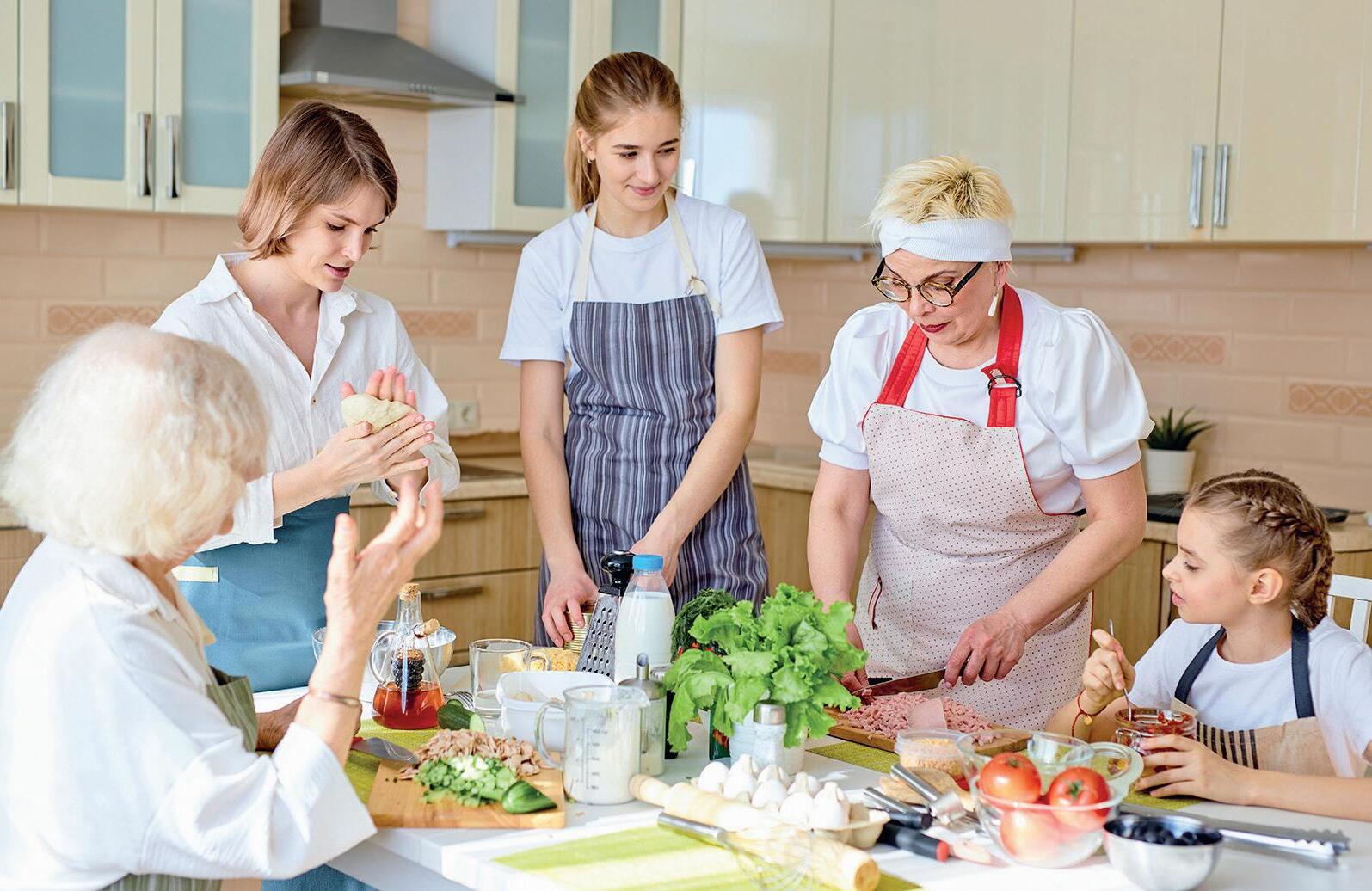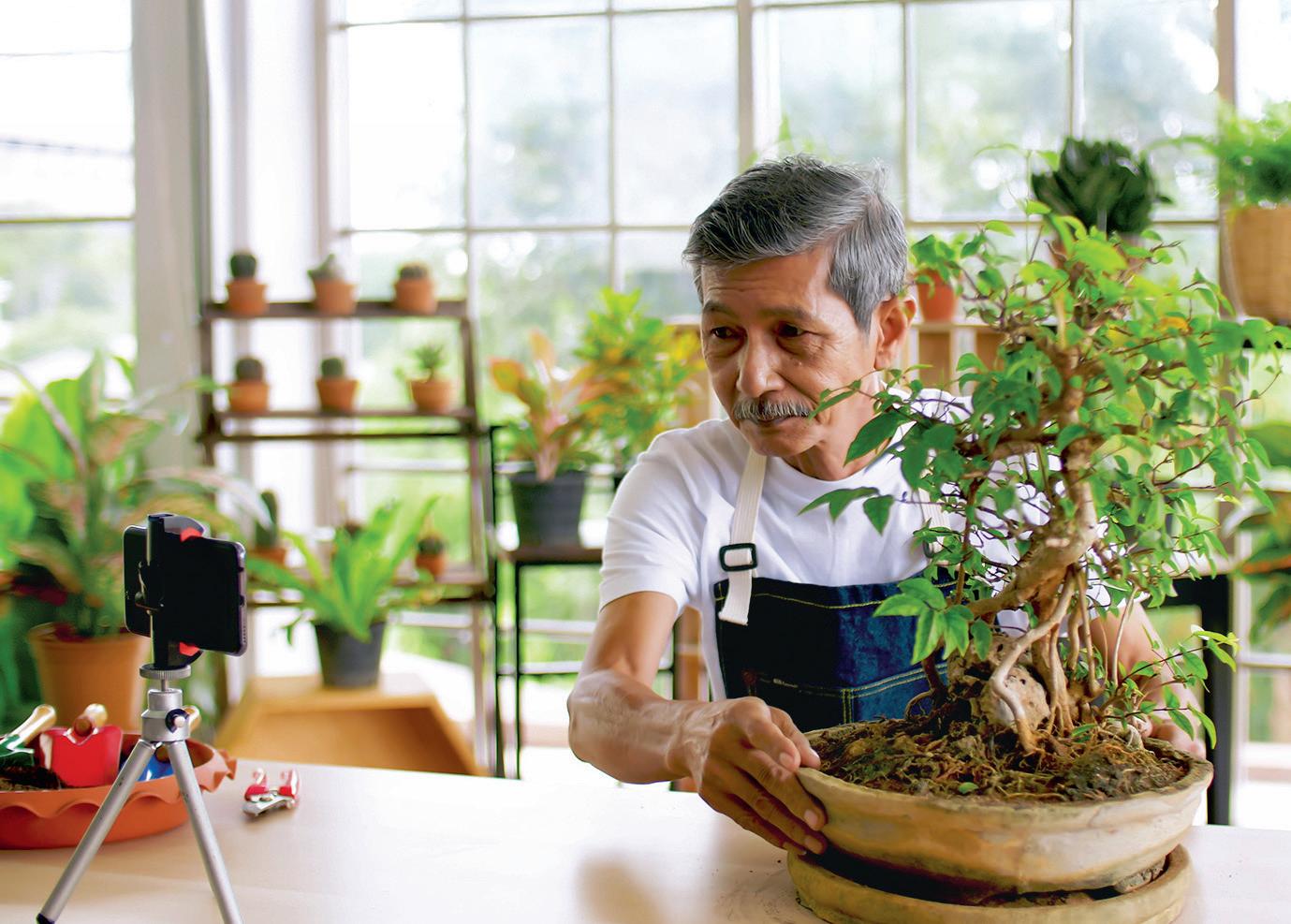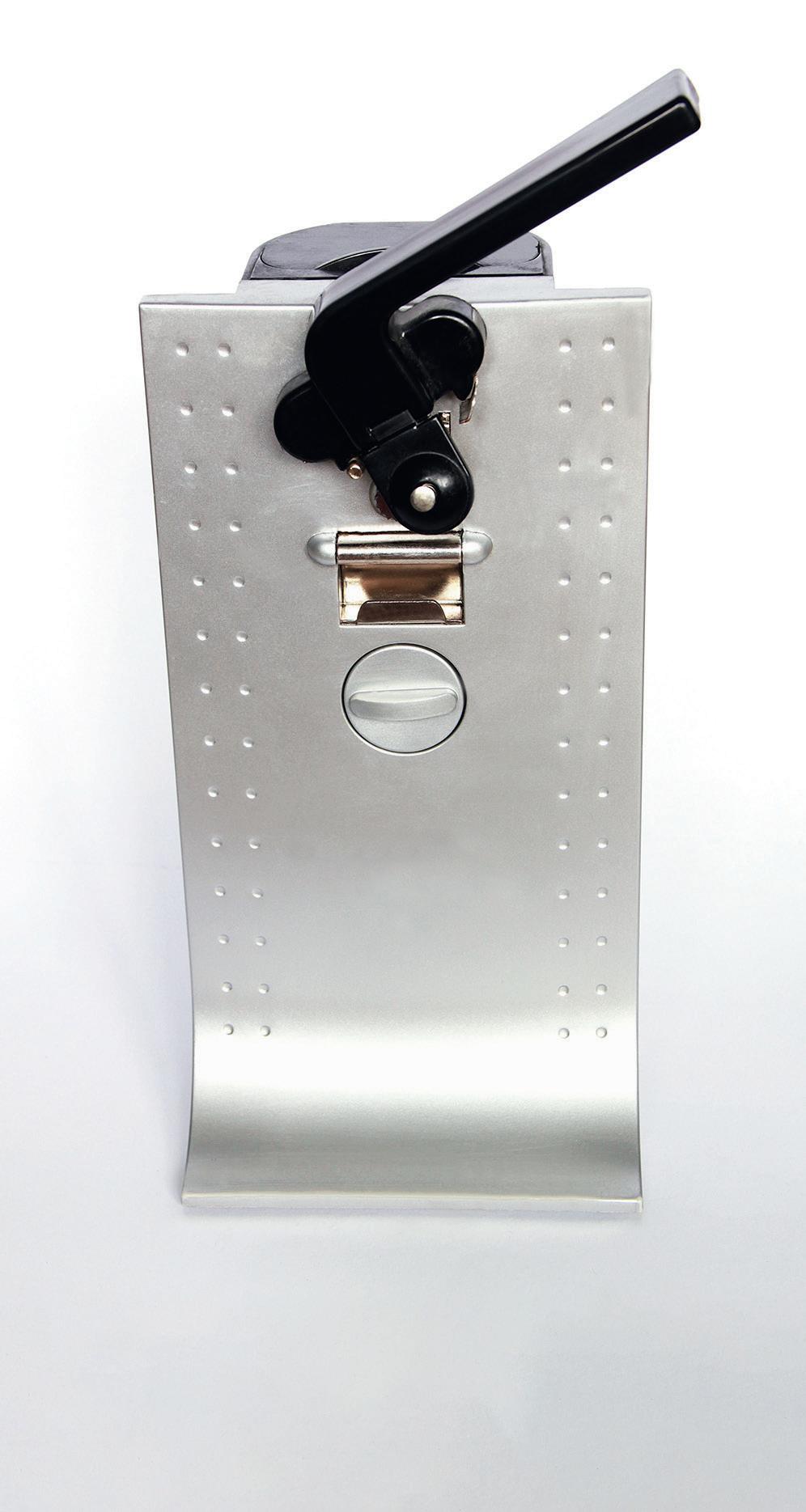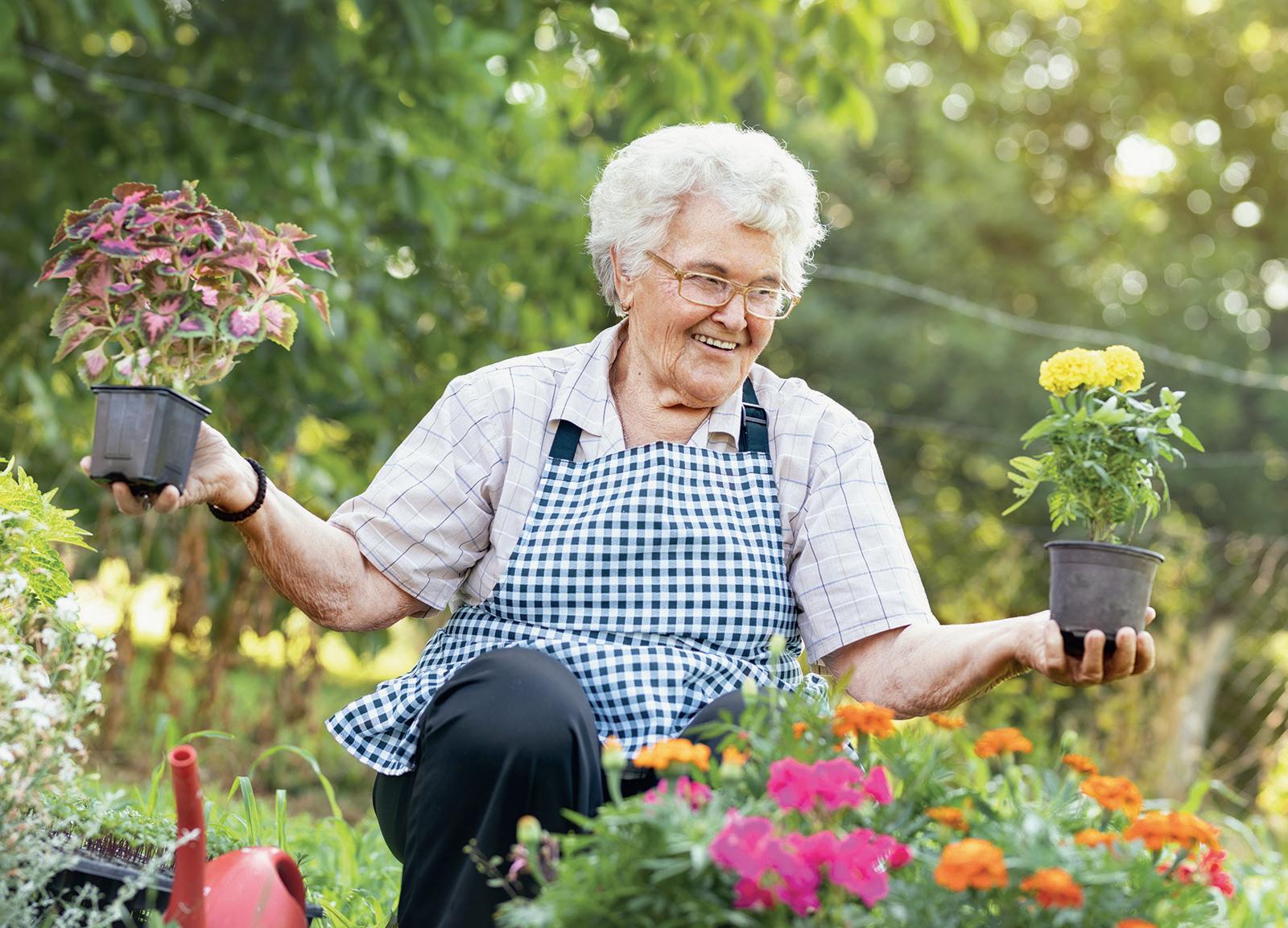Senior Fair Palouse LIVE BETTER, AGE SMARTER


Thurs July 17th • 10 AM - 3 PM West 1850 Pullman Road

Publisher From the
The Palouse Senior Fair is Back — and So Are We
As someone inching past the 50year mark, I’ll bemoan occasional back pain or make a passing remark about how my youthful physique is not quite what it used to be. That’s when my 16-year-old son hits me with these wise words: “Aging is just another word for living.”
Well said, Charlie.
Life is joy — a few aches and pains aside.
The pandemic put things on hold back in 2020, but the Palouse Senior Fair is back — and you, your family and your friends are invited.

Join us from 10 a.m. to 3 p.m. on Thursday, July 17, at Palouse Place Mall in Moscow.
This free community event is about connection, information, and a good dose of fun. You’ll find all kinds of local businesses and service providers offering insights on everything from health care, wellness, and assisted living to legal tips and financial planning. And if you’re feeling lucky — or just want to try your hand at something new — our lead sponsor, Clearwater River Casino and Lodge, invites you for a little excitement, too.
We’ll have live music, presentations, giveaways and plenty of friendly faces.
Oh, and one of my mall favorites? Auntie Anne’s soft pretzels. So tasty. I’ll share my bucket of bites with you.
Cheers to living well, Nathan.
PLEASE JOIN US on Thursday, July 17th at the Palouse Place Mall in Moscow — STOP BY ANYTIME 10 AM-3PM
The Palouse Senior Fair is a community-focused event that brings together area businesses, service providers, and organizations that support the needs of local seniors, caregivers, and their families.
This fair features vendor booths, informational speakers, and giveaways. It is FREE to the public.
It is for:
➤ Seniors across the Palouse region and beyond.
➤ Adult children and caregivers of seniors.
➤ Local service providers and health care professionals.
Avista

Have you recently joined the “50s club,” or have you been a member for a few years? Chances are you’ve started to notice changes in your health. Whether these changes are occasional or permanent, here are some tips to help you take good care of your health after 50.
WATCH WHAT YOU EAT
Choose nutrient-dense foods to slow muscle loss and help your body regulate cholesterol and blood sugar levels. Try putting these tips into practice:
• Eat fiber-rich foods whenever possible, such as starchy foods and legumes
• Always include fruit and vegetables in your meals
• Limit your intake of sugary, fatty and processed foods
• Add lean protein to your meals, such as poultry, fish or tofu
• Find out if you need any dietary supplements
STAY ACTIVE
Regular physical activity can help you maintain a healthy weight and reduce the risk of cardiovascular incidents, which are more likely to occur after age 50. Staying active can also improve your stamina, reduce stress and improve your sleep. Try to include these activities in your daily routine:
• Stretching
• Flexibility exercises
• Walking
• Cycling
• Swimming
Active Living 50+
Taking care of your health after 50: what you need to know
GET A GOOD NIGHT’S SLEEP
Quality sleep is essential to your health. It stimulates your metabolism to regulate your mood and weight and helps control your stress levels, which can have several physical and mental consequences. Improve your sleep by following these tips:
• Follow a sleep routine by going to bed and getting up at the same times every day
• Invest in a high-quality mattress and pillow
• Avoid using screens before bed
• Try not to consume caffeinated food and drinks, like coffee, tea, cola and chocolate in the evening
GET TESTED
The risk of developing diseases linked to the circulatory system or cancer increases as you age. An annual check-up with your doctor and knowing your family history will help you spot any signs and symptoms of illness at the onset. Find out about recommended vaccinations and the following tests:
• Mammogram
• Gynecological examination
• Colonoscopy
• Prostate exam
• Blood pressure check
• Blood tests
• Eye exam
Pay close attention to your body as you move into your fifties. If you notice any worrying changes in your body, consult a health professional, such as a doctor or pharmacist.
The Role of Seniors in Their Community Find Your Passion at Any Age

It’s important to reflect on the many ways older adults enrich our lives through their wisdom, experience, and compassion. They help preserve traditions, share valuable knowledge, and inspire younger generations to grow and succeed. Many volunteer their time, support families, and strengthen neighborhoods by staying active and engaged. Here are a few examples of how they contribute.
• They’re volunteers. Many seniors volunteer several hours a week or more. This enables them to put their time, effort and expertise to good use in the community.
• They’re mentors. Seniors have a wealth of experience and skills they can share and pass down to younger generations. They can be great role models and an important educational resource.
• They’re economic contributors. Seniors play a part in the local economy by attending sporting events and live shows. In addition, they spend money by eating and shopping at nearby businesses.
• They’re caretakers. Countless seniors help with childcare duties for their grandchildren. In addition, many provide various levels of support to a spouse or other relative who’s unwell or has restricted mobility.
Today, take a moment to recognize and thank the seniors in your life for their invaluable contributions to the community.
Age isn’t a barrier to learning new things. In fact, once you retire, you’ll have more time to explore your passions. Here are some tips for how to follow your bliss.
ASK YOURSELF THE RIGHT QUESTIONS
Here are a few questions you can ask yourself to help you identify your interests:
• What did you love as a child?
• What do you enjoy talking about with your friends?
• Do you have a secret dream?
• What are you good at?
Now is the time to take up that hobby you’ve always wanted to try.
EXPLORE THE POSSIBILITIES
Do you want to learn something new or increase your knowledge about a particular subject? If so, you may want to take an online course or go back to school. In addition, ta king up a hobby such as swimming, walking, gardening, cooking, painting, writing, pottery or woodworking can allow you to connect with a newfound interest.
INSPIRING PEOPLE
Here are three inspiring people who found success later in life:
• Colonel Harland Sanders was more than 60 years old when he succeeded in franchising his fried chicken restaurants.
• Laura Ingalls Wilder published her first novel, Little House in the Big Woods, at the age of 65.
• At 77, John Glenn became the oldest person to go into space.

Estate Planning

5 Essential Documents You Need as a Senior
Estate planning is crucial for seniors to safeguard their assets and ensure their wishes are respected. Here are five vital estate planning documents you should have:
1. Last will and testament. Your will dictates how your assets and property are distributed after your death. Local laws determine asset distribution without a will, potentially conflicting with what you want.
2. Living will (advance health care directive). Your living will outlines your medical treatment preferences if you become incapacitated. It covers decisions on life-sustaining treatments, organ donation and medical interventions, guiding healthcare providers and loved ones.
3. Financial power of attorney. This document appoints a trusted individ ual to manage your financial affairs if you cannot do so. It ensures bills are paid, investments are managed and financial obligations are met in your absence.
4. Beneficiary designations. These designate individuals who will receive specific assets, such as retirement accounts or life insurance proceeds, upon your death. Keeping beneficiary designations current ensures your assets pass directly to your chosen beneficiaries, bypassing the probate process.
5. Revocable living trust. You transfer ownership of assets to the trust while alive, avoiding probate upon your death. Trust terms specify asset distribution, providing privacy and efficiency in estate settlement.
Seek guidance from legal and financial professionals to help you create a comprehensive estate plan tailored to your needs.












STEVE WESNER Associate Vice President, Financial Advisor, Portfolio Manager


Investment growth strategies for individuals building towards retirement
Income growth strategies & wealth preservation for individuals at retirement and beyond
4 Kitchen Gadgets That Make Life Easier Stay in Shape by Gardening
If you love to cook but are finding it difficult to complete certain kitchen tasks as you get older, here are four gadgets that may come in handy.
1. Pitter. This tool allows you to remove the pit from cherries, olives and other small fruits with ease. Plus, it’s much faster to use than a paring knife.


2. Jar opener. This inexpensive gadget is ideal for any cook with reduced mobility, and there are numerous options available. However, it’s best to choose a device with a non-slip silicone grip that can open multiple sized lids.
3. Electric can opener. If you have limited mobility or reduced grip strength, this is the gadget for you. All you have to do is position the can and let the device do the rest.
4. Egg breaker. This tool can help you crack open eggs without any mess or bits of shell falling into your food. Some models also come with a bonus attachment that makes it easy to separate yolks from whites. To find other accessories that will make it easier to prepare the recipes you love, visit your local kitchen supply store.

If winter causes you to shift into a sedentary lifestyle, the arrival of spring is the perfect time to embrace a more active way of living. Are you looking for an activity that offers physical and mental benefits during the warmer months? It’s an excellent time to give gardening a try.
START SLOW
Gardening involves various movements like walking, bending and stooping. If you want to enjoy this hobby pain-free, try a little pre-gardening warm-up. Before putting on your gardening gloves, take a few minutes to stretch and rotate your wrists, ankles and shoulders.
As you slowly familiarize yourself with the different movements involved in gardening, you’ll engage all your muscles and joints more effectively. Don’t forget to take breaks.
BETTER PHYSICAL CONDITION
Gardening helps improve and maintain your physical fitness. Activities like lifting and digging strengthen your thigh and arm muscles and increase bone density. Weeding also enhances flexibility and supports good posture. All these activities contribute to improving your overall stamina.
BOOST
YOUR MOOD
Working with plants is an effective way to distract yourself from your daily worries. Focusing on the present moment and the small tasks at hand can help lower your stress levels. Gardening will certainly make you feel calmer, which is excellent for preventing anx iety and depression. Do you feel like getting your hands dirty? Find everything you need at your nearest garden supply store.
Don’t have a yard? No problem! Gardening can be done inside your home or on your balcony. You might also consider joining a community garden in your area.
4 Tips for Being an Awesome Grandparent
When it comes to becoming a grandparent for the first time, there’s something of a learning curve involved. Here are four tips to help you thrive in your new role.
1. BE AVAILABLE
Though family dynamics differ greatly from household to household, the most important thing you can offer is to be available for your grandchildren. In some cases, all that will be requested is that you watch them from time to time. However, some parents need a little more help.
2. RESPECT PARENTAL RULES
It’s important to talk to your grandchildren’s parents to establish ground rules as well as aspects of their routine that should be maintained when they spend time with you. Occasional changes are often welcome but try to avoid undermining their parental authority.
3. DON’T INTERFERE
Keep in mind that your grandchildren’s parents may not raise their little ones the same way you would. Let them approach parenting in their own way and provide input only when asked.
4. BE A POSITIVE PRESENCE
Children are sometimes more comfortable opening up to their grandparents than their parents, and it’s important that you make the effort to listen to them and take them seriously. This will lead them to feeling loved and cared for and help them develop their self-esteem.

Finally, do your best to find fun activities you can take part in together. While spoiling grandchildren with presents and sweets tends to be a part of the grandparenting gig, the most meaningful thing you can do is dote on them with your time, attention and love.


















7 Activities to Keep Fit After 50 4 Myths About Seniors’ Residences
Want to stay healthy for as long as possible? In addition to eating well and getting plenty of sleep, keeping active is essential. If you’re over 50 and looking for sports or activities that fit your dynamic lifestyle, consider these options.
1. Swimming. This low-impact activity is perfect for improving your cardiovascular health and muscular endurance.
2. Gentle gymnastics. Activities like yoga, Pilates, tai chi and Qigong improve muscle tone and balance while reducing stress.

3. Walking. A daily stroll is an accessible and easy way to include exercise in your daily routine. Walking—ideally outdoors—increases your heart rate and helps maintain bone density as you age.
4. Gym training. Gym training can help preserve muscle mass and boost your cardiovascular health. Programs can be tailored to your personal fitness goals.
5. Line dancing. This group activity provides a fun cardiovascular workout. It also helps stimulate your memory and balance while promoting social interaction.
6. Cycling. Whether you ride outdoors on a flat surface or work out on a stationary bike, cycling is an excellent way to strengthen your heart and legs.
7. Pickleball. This playful sport helps improve endurance and agility. It combines the benefits of physical activity with socializing.
Making time for regular exercise after the age of 50 is vital for your fitness and overall well-being. Explore the opportunities available in your community today.

Even in 2025, many misconceptions exist about seniors’ residences. Do any of these myths sound familiar? Find out what’s true and what’s not.
1. “THEY’RE ONLY FOR THE RICH”
While high-end seniors’ residences exist, many others offer safe, comfortable and affordable housing options. It’s important to assess your budget and explore available options.
2. “THEY’RE ONLY FOR PEOPLE WHO NEED HELP”
Absolutely not! Many seniors’ residences welcome active individuals in good health who work or volunteer reg ularly. Residents can enjoy the numerous benefits of this lifestyle while leading an active life.
3. “THEY SERVE THE SAME FOOD EVERY DAY”
Quite the opposite. Seniors’ residences provide diverse meals tailored to the pref erences and dietary needs of their residents. If food is a significant factor for you, inquire about the menu options or ask to purchase a meal so you can try it firsthand.

4. “IT’S A BAD FINANCIAL CHOICE IF MY HOUSE IS ALREADY PAID OFF”
Even if your mortgage is paid off, home ownership comes with various expenses such as repairs, snow removal, insurance and utilities. You may find that living in a seniors’ residence, with its many activities and services, could make more financial sense.
Tour your local seniors’ residences to dispel these misconceptions and discover the reality for yourself.

Make a Plan How to Successfully Transition to Retirement: Is 70 the happiest age?
If you’ve been working for several years, it may soon be time to retire. Whether you’re looking forward to it or feeling anxious, these strategies can help you navigate the transition smoothly.
TAKE A GRADUAL APPROACH

Do you love your job? Are you in good health? If so, you don’t necessarily have to stop working overnight. Talk to your employer about the possibility of gradually reducing your work ing hours over a few years.
This way, you can enjoy having more free time to care for your loved ones, pursue hobbies or take courses. The more familiar you become with your new routine before fully retiring, the less anxious you’ll feel about the change.
FINANCES
Transitioning to retirement can significantly impact your income. Therefore, it’s essential to carefully man age your finances before altering your work schedule. Speak with a financial expert to ensure you can achieve your retirement goals while maintaining your quality of life.
Retirement is a significant milestone that requires proper preparation. Your thoughtful planning can help you face this transition with confidence and peace of mind.

According to research, it seems the age most people are happiest is 70. Does that surprise you? Here’s why this period of life is sometimes called the Age of Happiness.
FACTORS IN YOUR FAVOUR
Why, despite losing their youthful energy, do people at this age tend to say they’ve never felt better? The reasons may vary, but the following factors are consistent:
• They let go of the pressure to perform or please others at any price

• They lose job-related stressors
• They have more time to do activities they truly love
• They realize that time is finite and make the most of every moment
• They have more life experience that gives them a profound sense of wisdom
In a nutshell, seventy-somethings have nothing left to prove, have fewer work-related worries and are relieved of childcare responsibilities. They have free time to do whatever makes them happy, like volunteering, gardening, reading, travelling, learning or socializing.
Indeed, various factors can detract from this rosy picture, such as health issues, loneliness or financial difficulties. Therefore, don’t wait until your 70th birthday to start taking care of your health and cultivating friendships. Also, talk to a financial advisor for help creating a retirement nest egg.







Find Your Dream Job After 50: Expert Advice

Have you been dreaming of changing jobs for a long time? It’s never too late to change direction, even if you’re in your fifties. However, this decision shouldn’t be made on a whim. Here are some tips to guide you.
• Talk to a career counsellor to help you learn more about yourself and explore all the possibilities available to you, including options you might not have initially considered, such as seasonal work or self-employment.
• Identify gaps in your knowledge or skills and sign up for relevant training courses. If applicable, take advantage of government grants or programs designed to support experienced workers going back to school.
• Update your resume and social media profiles, such as LinkedIn.
• Let your friends and family know you’re looking for a new job. Word-of-mouth can be incredibly effective.
Above all, be confident in your strengths. Your extensive experience and maturity are invaluable assets that can lead to a successful future career.

3 Benefits of Volunteering in Retirement

Retirement isn’t just the end of a working life — it also brings a new reality for many people: an abundance of free time. Are you looking for a way to keep busy while doing something useful? Here are three advantages of volunteering in retirement.
1. IMPROVE YOUR PHYSICAL AND MENTAL HEALTH
Volunteering often involves physical activity, which can help lower your blood pressure and cholesterol levels in the same way as playing sports. It’s also a great way to reduce stress and alleviate symptoms of depression.
2. FEEL USEFUL
Retirement can leave you feeling unproductive, which is perfectly normal when you’re going through a change. Volunteering with an organization that aligns with your values will give you meaningful work and a sense of purpose.
3. MEET NEW PEOPLE
Isolation and loneliness are genuine issues for seniors. Volunteering is an excellent way to meet people who share your interests and build new friendships.
Retirement is a unique stage in life, and volunteering is a great way to make the most of it. Contact volunteer or community organizations in your area to find volunteering opportunities.





Traveling Solo as a Senior: Tips for Safe and Enjoyable Adventures
Traveling solo as a senior can be an en riching and liberating experience, but it requires careful planning and consid eration. Here are some essential tips for embarking on a solo adventure:
1. Plan ahead. Research your destination thoroughly and plan your itinerary. Consider factors such as transportation options, accommodation suitability and accessibility of attractions.
2. Stay connected. Keep your loved ones informed of your travel plans. Share your itinerary and contact information with a trusted friend or family member and check in with them regularly.
3. Pack wisely. Pack light and include essentials such as medications, copies of important documents and emergency contacts. Consider bringing a mobile phone with international coverage.
4. Prioritize safety . Be aware of your surroundings, especially in unfamiliar places. Avoid risky situations and trust your instincts. Stick to well-lit and pop ulated areas, especially at night.

5. Embrace technology. Use technol ogy to your advantage by downloading travel apps for navigation, translation and safety. Consider carrying a personal safety device or using the location-sharing feature on your smartphone.
6. Stay healthy. Prioritize your health by maintaining a balanced diet, staying hydrated and getting adequate rest. Be mindful of your physical limitations and pace yourself.
7. Connect with locals. Engage with locals to enhance your travel experience and gain valuable insights into the culture and customs of your destination. Join guided tours, attend cultural events or strike up conversations with fellow travelers.
Embrace the freedom of solo travel and enjoy exploring at your own pace!





